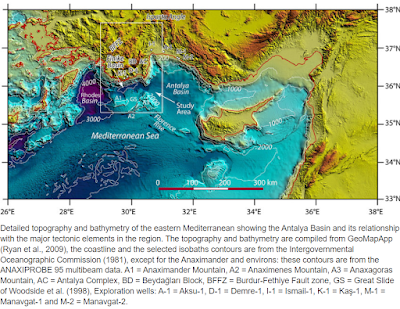The 1982 UNCLOS is an acceptance-based convention.
The 1982 United Nations Convention on the Law of the Sea is not the only source for law of the sea. In fact, it is the weakest resource because it is a contract.
The riparian states of the Eastern Mediterranean are attempting to declare an Exclusive Economic Zone to explore and exploit hydrocarbon resources. A coastal state can declare an Exclusive Economic Zone (EEZ) without being a party to the United Nations Convention on the Law of the Sea (1982 UNCLOS). Türkiye and the TRNC are not parties to the United Nations Convention on the Law of the Sea (1982 UNCLOS), they have the right to declare an Exclusive Economic Zone.
Although Turkey is not a party to the United Nations Convention on the Law of the Sea, it is aware that the provisions of the contract have also become customary due to the fact that many countries are party to it and implement the rules of the said convention. Customs, which are a direct source of international law, are as effective and binding as international agreements, and since Turkey is customary law, it applies many of its articles and rules. Approximately 30 countries, including the USA, Colombia, Israel, Peru, Venezuela and Turkey, are not yet parties to the Convention.
It is also of great importance for Türkiye to determine the borders of the Exclusive Economic Zone and to direct its policies and practices in the Eastern Mediterranean according to these borders. Policies are needed to integrate with the declaration of the Exclusive Economic Zone. In the new policy to be determined, two options are on the table;
The first is to search for hydrocarbons within their Exclusive Economic Zones, which the Republic of Turkey and the TRNC will declare separately as independent states.
The second is to conduct hydrocarbon explorations in the new Exclusive Economic Zone, which will be announced by focusing on the integration of the TRNC with Turkey from next year, taking into account the changing international conditions.
In both cases, priority should be given to the exploration of potential resources in our marine area. It is a fact that we have not done much exploration and exploration in the deep seas and we have neglected our seas until now. This is more true for the Eastern Mediterranean. An oil and natural gas exploration campaign should be launched to cover all our sea areas, both by developing our own opportunities and by partnering with foreign companies with deep-sea exploration technology.
Sovereign rights and powers
The continental shelf and the Exclusive Economic Zone grant the coastal state sovereign rights and powers over natural resources. The prevailing rule at this point is the principle of "the land dominates the sea". In other words, states have sovereign rights and powers in the sea areas adjacent to their coasts because they are on the coast of the sea.
The Greek Cypriot Administration's refusal to recognize the TRNC as a legitimate political authority, while the TRNC and Turkey reject the Greek Cypriot Administration's claim that the island has sole say, even if the EU and other relevant international actors do not accept the TRNC as a state. Despite accepting the rights of the Turkish existence in the island, the fact that they only made treaties with the Greek Cypriot Administration in violation of the rights of the Turkish Cypriots in matters concerning the entire island, the division of the Eastern Mediterranean maritime areas has become a part of the sovereignty issue over the island, rather than being a mere maritime issue.
According to the Permanent Sovereignty Decision of the United Nations General Assembly on natural resources of 1962, it is said that natural resources belong to the peoples and nations living in that country, and states are never mentioned. In this sense, it is absolutely unacceptable for the Greek Cypriot Administration to usurp the rights of the Turkish Cypriots with its so-called EEZ, which it unilaterally declared illegally.
The 1982 United Nations Convention on the Law of the Sea is an acceptance-based convention.
The concept of the Continental Shelf, which is included in the UN maritime law, provides the states to have rights over the seas spontaneously without any notification, and also paved the way for the start of international studies on the delimitation of maritime jurisdiction areas.
The codification studies initiated by the International Law Commission within the United Nations tried to clarify many issues related to maritime areas, and with the subsequent United Nations Law of the Sea Conferences, first the 1958 Geneva Law of the Sea Conventions and then the 1982 United Nations Law of the Sea Convention were brought into international law of the sea.
The historical development process of the Law of the Sea consists of international customary rules. The international customary rules codified by the International Law Commission have been transformed into written texts with the United Nations Conventions on the Law of the Sea.
Although many concepts and rules regarding the law of the sea are included in the United Nations Conventions on the Law of the Sea, the implementation of these concepts and rules in a concrete case has been possible with the cases brought before the international judicial bodies.
In particular, the fact that no method of limitation has been determined in the United Nations Conventions on the Law of the Sea has given the international judicial bodies a wide margin of appreciation. The most important issue that comes to the fore in the delimitation of maritime areas is which principles and methods will be applied in the disputes regarding the delimitation of maritime jurisdiction areas.
The United Nations Conventions on the Law of the Sea refer to Article 38 of the Statute of the International Court of Justice as a source of law in delimitation of the continental shelf and the exclusive economic zone. Accordingly, it has been recommended to go to an agreement first in order to reach a fair solution to the dispute.
In the case of referral of the dispute to the international judicial organs, the principles of fairness stipulated by the customary rules in order to reach a just solution are also stated in the relevant provision of Article 38 of the Statute and frequently emphasized by the international judicial bodies.
As stated in the relevant articles of the 1982 United Nations Convention on the Law of the Sea regarding the limitation provisions, making an equitable limitation in order to reach a "fair" solution means applying abstract concepts in a concrete case, international judicial bodies have been given wide discretion. For this reason, the principles and methods that judges will apply under the umbrella of customary law are of great importance for the safety of the case.
International judicial decisions are considered among the auxiliary sources in international law. However, in the law of delimitation of maritime areas, judicial decisions are as important as primary sources. The principles and methods used by the International Court of Justice and other international courts in resolving a dispute provide guidance for subsequent cases in terms of case law.
Considering the development process of maritime law, international customary rules regarding maritime law have been put into writing through conventions and have become an international document. International customary rules continue to be valid for states that are not party to the conventions.
In this respect, whether we are a party to the convention or not, the main source of law that guides the dispute cases before the international judicial organs is international customary law. The principles and methods applied by the Court or Courts in a concrete dispute case may be in the nature of a statement of a customary rule, or it may cause a change or abolition of a customary rule or even the formation of a new customary rule.
For this reason, it is expected that the legal approach of the Court or Courts when resolving a concrete dispute case regarding the delimitation of maritime areas will be an effort to stay within the customary international law.
Since the international law of the sea is a field of law in which the treaty law and customary law are clearly intertwined, whether a dispute is concluded by agreement or by a judicial decision, the way to be followed in the law of limitation is to make a limitation according to the principles of equity on the basis of customary rules. In addition, the principles to be taken into account in terms of the states that are not party to the conventions and the third states that are subject to restriction will be the principles determined according to the customary law.




Comments
Post a Comment